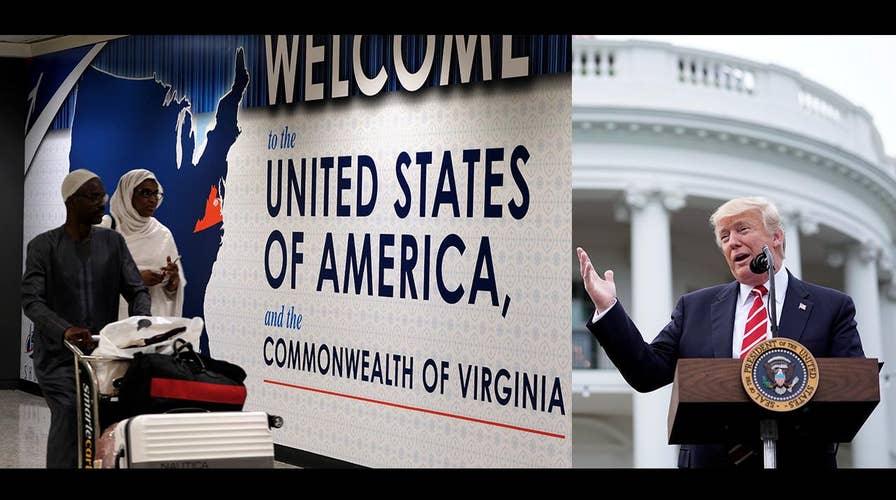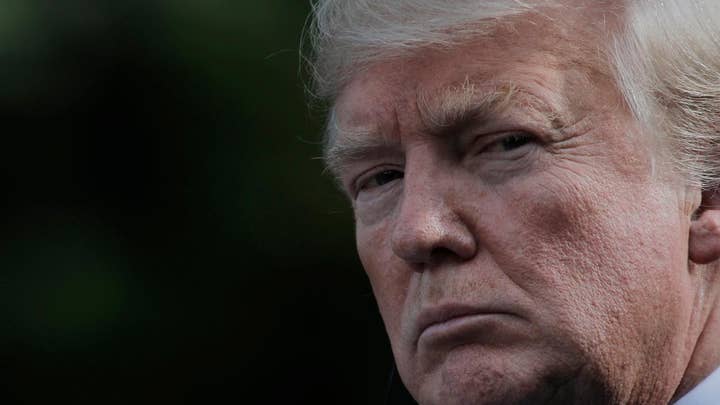Trump’s travel ban: Who's allowed in and who's barred?
President Donald Trump's travel ban of foreign visitors from six Muslim-majority nations takes effect. But those with 'bona fide relationships' in the US will be allowed to enter the country. Who does that include?
The Trump administration on Wednesday set new criteria for visa applicants from six mainly Muslim nations and all refugees that require a "close" family or business tie to the United States.
The move came after the Supreme Court partially restored President Trump's executive order, which was widely criticized as a ban on Muslims.
The new rules take effect at 8 p.m. ET on Thursday.
Visas that have already been approved will not be revoked, but instructions issued by the State Department say that new applicants from Syria, Sudan, Somalia, Libya, Iran and Yemen must prove a relationship with a parent, spouse, child, adult son or daughter, son-in-law, daughter-in-law or sibling already in the U.S. to be eligible.
The same requirement, with some exceptions, holds for would-be refugees from all nations who are still awaiting approval for admission to the U.S.
Grandparents, grandchildren, aunts, uncles, nieces, nephews, cousins, brothers-in-law and sisters-in-law, fiancees or other extended family members are not considered to be close relationships, according to the guidelines that were issued in a cable sent to all U.S. embassies and was obtained by The Associated Press.
As far as business or professional links are concerned, the State Department said a legitimate relationship must be "formal, documented and formed in the ordinary course rather than for the purpose of evading" the ban.
Journalists, students, workers or lecturers who have valid invitations or employment contracts in the U.S. would be exempt from the ban. The exemption does not apply to those who seek a relationship with an American business or educational institution purely for the purpose of avoiding the rules, the cable said. A hotel reservation or car rental contract, even if it was pre-paid, would also not count, it said.
Consular officers may grant other exemptions to applicants from the six nations if they have "previously established significant contacts with the United States;" "significant business or professional obligations" in the U.S.; if they are an infant, adopted child or in need of urgent medical care; if they are traveling for business with a recognized international organization or the U.S. government or if they are a legal resident of Canada who applies for a visa in Canada, according to the cable.
Critics said they are watching closely to see how the guidelines are used.
"Initial reports suggest that the government may try to unilaterally expand the scope of the ban -- for example, by arbitrarily refusing to treat certain categories of familial relationships as `bona fide.' These reports are deeply concerning. We are watching for official word," said Omar Jadwat, director of the ACLU's Immigrants' Rights.
On Monday, the Supreme Court partially lifted lower court injunctions against Trump's executive order that had temporarily banned visas for citizens of the six countries. The justices' ruling exempted applicants from the ban if they could prove a "bona fide relationship" with a U.S. person or entity, but the court offered only broad guidelines -- suggesting they would include a relative, job offer or invitation to lecture in the U.S. -- as to how that should be defined.
Senior officials from the departments of State, Justice and Homeland Security had labored since the decision to clarify the ruling and Wednesday's instructions were the result. The new guidance will remain in place until the Supreme Court issues a final ruling on the matter. Arguments before the justices will not be held until at least October, so the interim rules will remain in place at least until the fall.
Earlier this month, the Trump administration approved a new questionnaire for U.S. visa applicants that asks for social media handles and accounts used during the last five years and travel history, including the source of funding for trips, over the past 15 years, for more “rigorous” vetting.
The State Department requested expedited consideration and “emergency review” from the Office of Management and Budget on May 5 for the new visa application protocol. Fox News can confirm that OMB has approved the new measures.
Under the new rules, would-be immigrants from the six countries who won a coveted visa in the government's diversity lottery -- a program that randomly awards 50,000 green cards annually to people from countries with low rates of immigration to the United States -- will also have to prove they have a "bona fide relationship" within the U.S. or are eligible for another waiver or face being banned for at least 90 days. That hurdle may be a difficult one for those immigrants to overcome, as many visa lottery winners don't have relatives in the U.S. or jobs in advance of arriving in the country.
The Associated Press contributed to this report.





